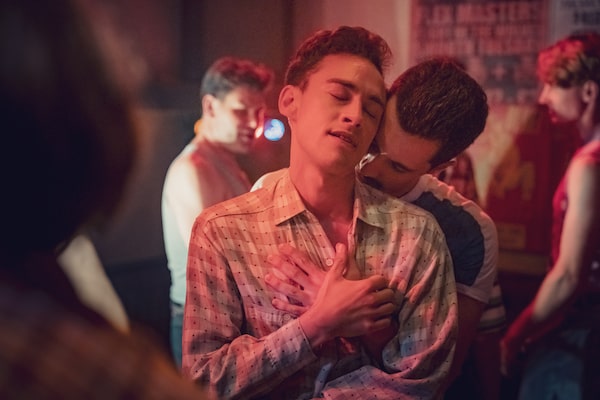
Olly Alexander stars as Ritchie in It's A Sin on Amazon Prime.Ben Blackall/Amazon Prime
New York City, 1984. I had just landed my first job, as the assistant to Art Cooper, editor-in-chief of GQ magazine. There was an adonis in the art department, a tall blond named Jon Shaheen. I can still see him in a Brooks Brothers Black Watch plaid shirt (GQ’s office was on Madison Avenue, and Brooks Brothers was right downstairs), sleeves rolled up just so on his perfect forearms. But he started to get thinner. Too thin. His skin greyed. And then one day, he just didn’t work there anymore.
Which is why I angry-cried through all five episodes of the British series It’s a Sin, now on Amazon Prime. Created by Russell T. Davies, the Welsh screenwriter and producer behind Queer as Folk and Years and Years, the series caused a stir when it aired in the U.K. in January, and deservedly so. It follows three gay men from 1981 to 1991: beautiful Ritchie (Olly Alexander), an actor; charismatic Roscoe (Omari Douglas), an impresario; and shy Colin (Callum Scott Howells), a clerk. They move to London searching for freedom, only to find themselves in the thick of the AIDS crisis. Many of the cast, including Alexander, Howells, Stephen Fry and Neil Patrick Harris, are openly queer, which is what Davies wanted. “For these five hours,” he said, “I wanted to create a safe space where gay actors could voluntarily come in and be themselves.”
As the episodes progressed – I mainlined them – I was zapped back to those days so thoroughly that I can’t believe I ever shook them off. The dawning horror of how many were dying: The first news story about the “mysterious” deaths among gay men ran in the New York Native, a gay newspaper, in 1981. The U.S. Centers for Disease Control reported its first five cases that June.
The way the deaths quickly became a fact of life: The CDC settled on the name AIDS in 1982, and the first death of someone I knew personally – my mother’s decorator, Harrison Cultra, who also worked with Jacqueline Onassis – occurred in September, 1983. He was 42. Like so many other people who died of AIDS, his New York Times obit never mentioned it. It read “died at New York Hospital after a brief illness.”
The grim upward march of the numbers, in the U.S. alone: 853 dead in 1982. 2,304 dead in 1983. 4,251 dead in 1984. 5,636 dead in 1985. The fury that only then, in September, 1985, did U.S. President Ronald Reagan finally say the word AIDS in public.
GQ’s staff, like so many in fashion and the arts, was hit hard. The magazine’s previous editor, Jack Haber, died in 1984, a year after he left the magazine. He was 45. Douglas Hess, who’d been in the fashion department, died; so did Kim Foltz, a features editor. Peter Carlsen, a fiercely intelligent columnist who covered fashion and design, contracted AIDS but wouldn’t live with it; he killed himself and was found dead in his apartment on the day after Christmas, 1989. You would ask a colleague what they’d done over the weekend, and they’d tell you about the funeral they’d been to – how it had been fancier or quieter than the funeral they’d been to last weekend; how they’d heard the same song at four funerals in a row; whether only friends came, or some family members actually showed up this time.
It’s a Sin reminds us how cruel, how medieval, AIDS deaths were, as a host of diseases modern doctors had never seen swarmed into shredded immune systems. It also details the gruesomeness of some British laws – one allowed patients to be locked in wards and left to die in lonely agony; another forbade public institutions from informing children about homosexuality. (Watch for the great scene in which a character searches in vain for LGBTQ+ characters in classic literature.)
Davies zeroes in on three lives, but he makes a convincing case that the staggering indifference of Reagan and other world leaders, who knew and did nothing, was a crime against humanity. All echoes to the present-day crime against humanity perpetrated by Donald Trump, who ignored COVID-19, leading to the deaths of 500,000 Americans, are intentional. The difference, of course, is that COVID-19 affects everyone, so it’s less stigmatized.
The “sin” of Davies’s title has nothing to do with being gay. The sin is the shame that was ground into the souls of the dying. The final episode drives that home with two speeches. One is a blistering rebuke to society at large and to every individual who makes up that society, for the culture of shame that led to silence that led to death. The other, though, is a defiant shout-out to joy – to the fun, the beauty and the glory of a life lived, however fleetingly, without shame.
The character that made me shiver with recognition – Carol (Tracy Ann Oberman), Ritchie’s agent – has just a couple of scenes. But in one of them, she says this to Ritchie: “Boys like you are going home. They go home, and they never come back.” In 2019, 1.7 million people around the world contracted AIDS, and 690,000 people died from it. The total death toll, from 1981 to the end of 2019, is 32.7 million. But we don’t talk about that anymore.
I wish I’d gone to Jon Shaheen’s funeral. I wish I knew when he died. He just went away, and he never came back.
Sign up for The Globe’s arts and lifestyle newsletters for more news, columns and advice in your inbox.